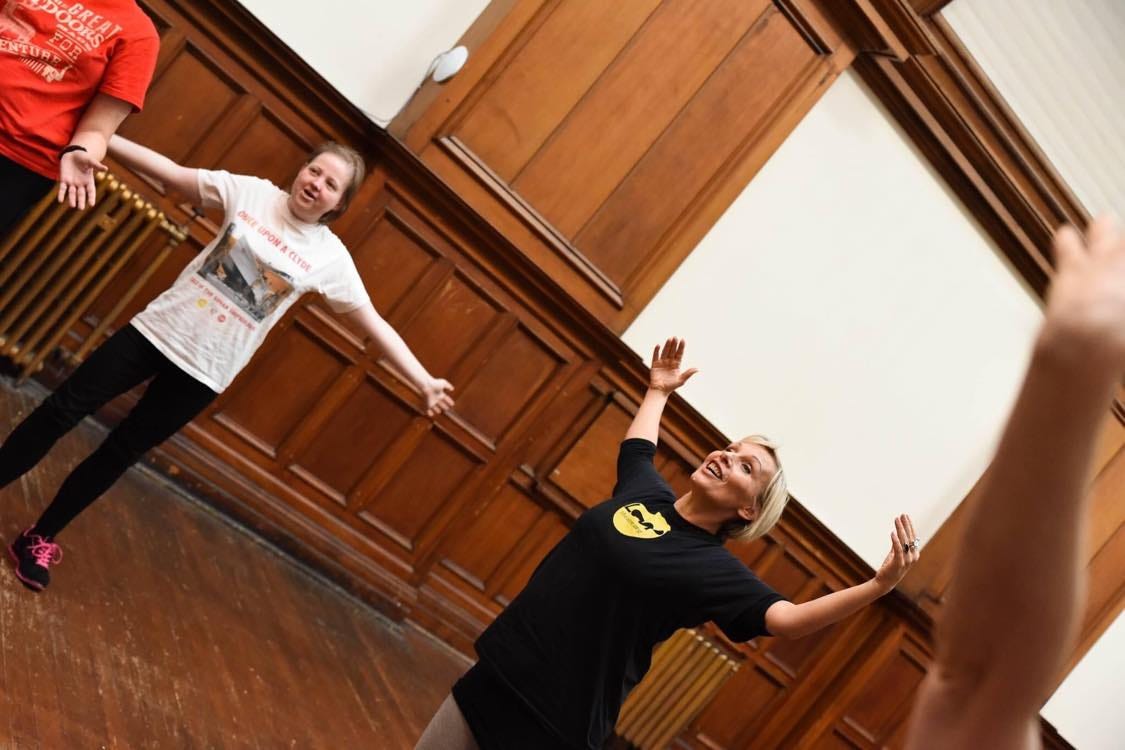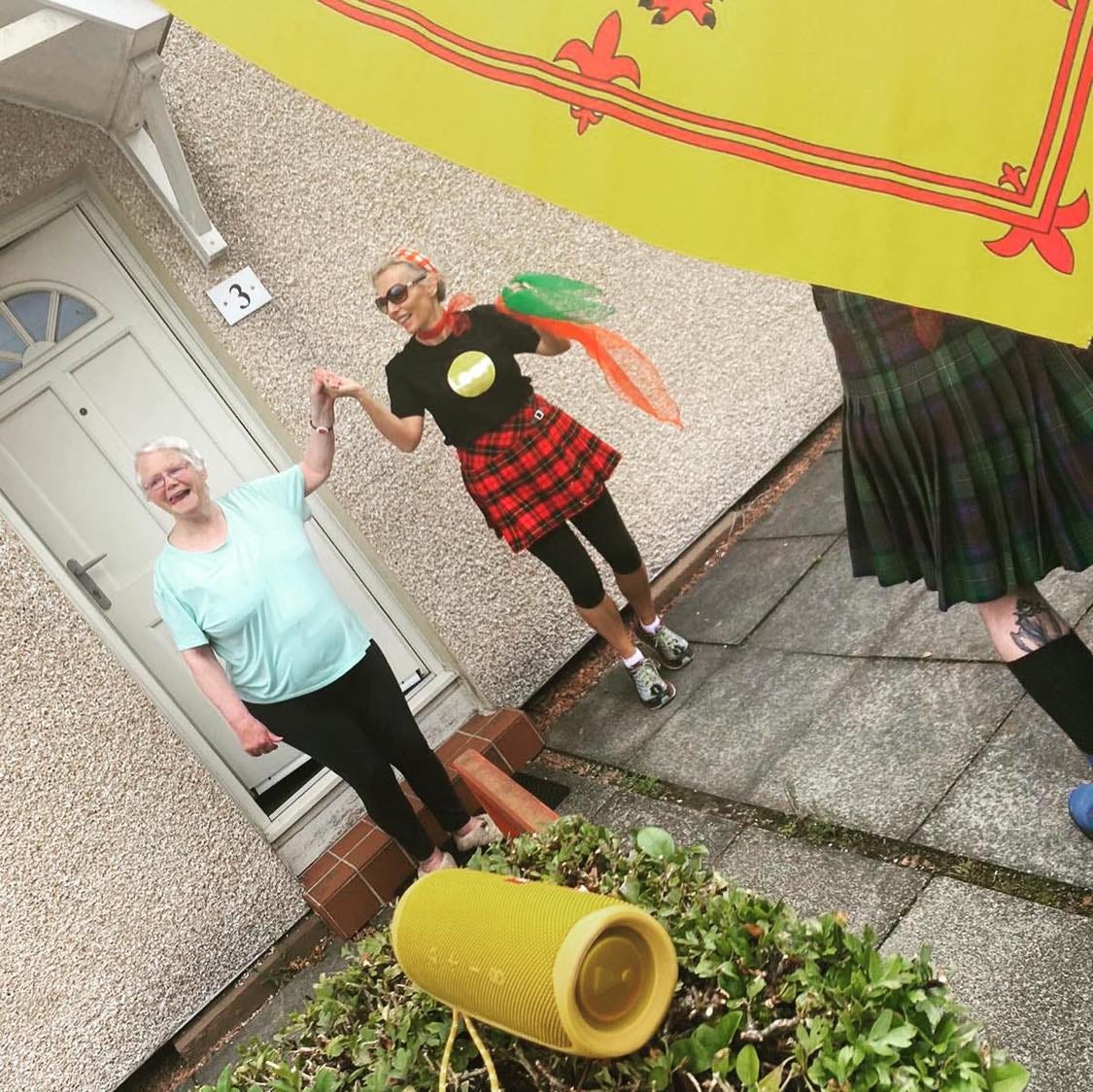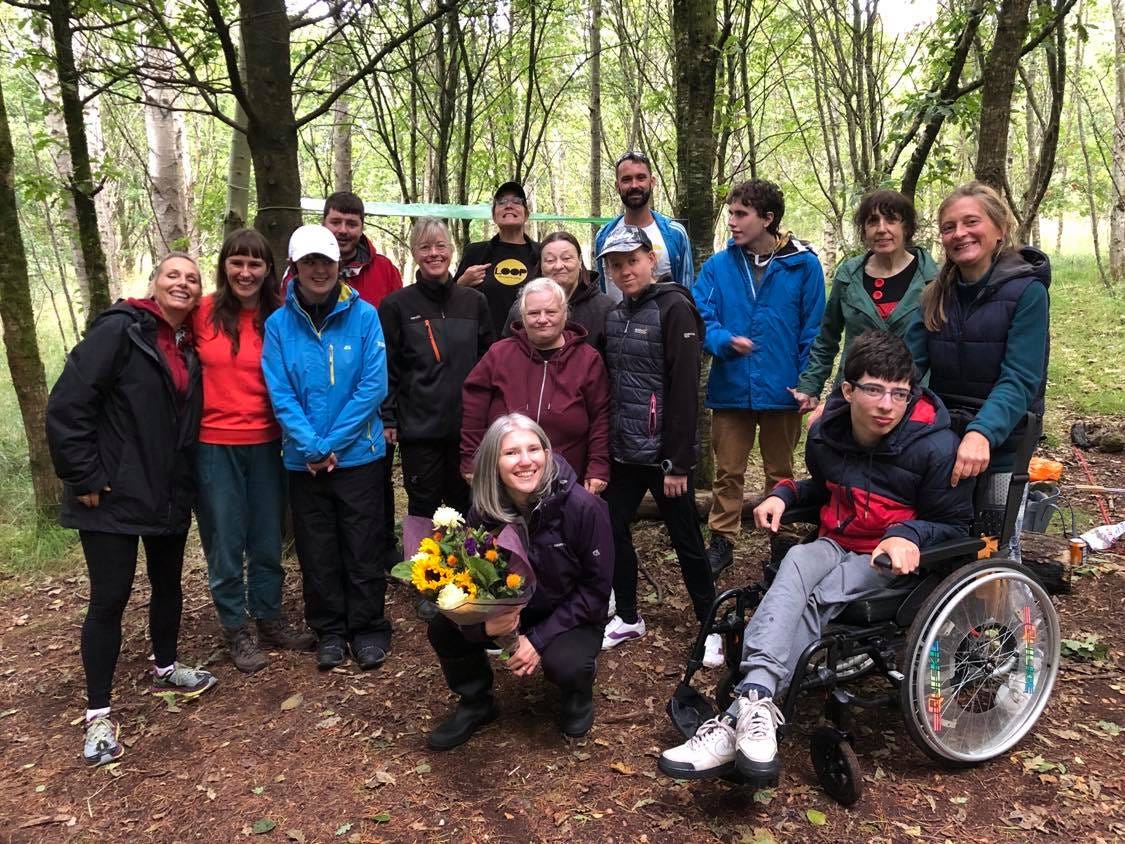Why you don't need to explain yourself
On the couch with Laura Edwards from Loop Theatre
I literally was on the couch with Laura Edwards. Laura Edwards is an artist, theatre director and chronically ill person.
We’d been in contact for a while, as I was interested in working with her company, Loop Theatre, in Glasgow (Scotland) but we’d never managed to meet up. Finally, I was back in Glasgow after two years stuck abroad, so I took the opportunity to propose a meet-up.
Laura had a lot of work on and told me she’d have to do the interview at home, which we did, lying on the couch with her dog. As a fellow chronically ill person, I appreciated her honesty. For me, the best thing about building up a network of chronically ill and disabled artists has been the ability to make accommodations for each other, whether it’s conducting zoom meetings from bed or having to cancel last minute, knowing there'd be no judgement on either side.
Loop Theatre Company is a collective of multi-skilled artists, encompassing drama, dance, movement, circus, visual arts, music and technical theatre. The artists have learning disabilities, and Loop Theatre’s aim is to break down barriers. It is a space for Laura and her collaborators to share their contributions with the wider artistic community.
“Let's be honest, most artists are neurotic”
I’d first approached Laura because I’d wanted to know more about the Glasgow landscape for disabled people in the arts. I lived in Glasgow almost ten years ago, and at that time, things were changing, but disabled people in the arts were still marginalised. Laura tells me that the situation is steadily improving, and doors are beginning to open for them, but they still have some way to go. She refers to her team as, ‘very opinionated’ artists: “Let’s be honest, most artists are neurotic.” She stresses the importance of mutual respect, boundaries and being able to take a time-out in rehearsals.
Laura has Chronic Fatigue Syndrome, ADHD and has had her fair share of battles in life. She is straight-talking, which I really appreciate. I’ve worked with a few theatre directors in my time, and there is often this unnerving perception you never quite know where they stand. With Laura, it’s clear.
We find out that we both grew up in Camden, London. She went to Haverstock and got chucked out at the age of fourteen. I remember Haverstock kids being the ones you didn’t mess with. When I tell her I went to Camden School for Girls, Laura tells me, “I used to fucking hate you girls!” I am not surprised tbh, as I didn’t like us much either, and struggled to make friends.
Camden School for Girls was a state school (public in American) but was known for excelling in exam scores. The catchment area was as a result, quite small. It was a mix of social housing, council estates, but also big town houses owned by the ‘London Metropolitan elite’. Laura mentions it not being the hand she was dealt with, and I know exactly what she means, because to get in you either had to be lucky, or middle-class. I was the latter.
I saw some parallels in our stories. I didn’t get on well at school. I was suspended for fighting, and at the age of fourteen I was sent away from London because of my ‘challenging behaviour’ to go and live with my dad in Glasgow.
“I understand what it's like to be excluded”
That was the impetus for Laura to start Loop Theatre. “Never underestimate people”, she says, particularly people with disabilities. “Also, we don’t wanna hear ‘ah bless’. Anyone who says, ‘ah bless’ can go fuck themselves.” She doesn’t want pity and neither do her fellow artists. They want their work to be enjoyed and appreciated on its own merit.
Laura had a long journey to get where she is now. She tells me parts of it, in the same direct and practical manner. She did education backwards, had a kid at twenty-two and went to university later. There was homelessness, living in temporary accommodation in London whilst battling health and mental illness.
We talk at length about how to get to a place where you don’t think about yourself as if you are, “a piece of shit”. She keeps coming back to this phrase and I don’t think there is a better way to describe how you talk to yourself when faced with overwheming self-doubt.
For many years Laura was, ‘dipping her toe in’ the arts world, but feeling like, ‘the artist’s shadow’. She refers here to a concept in the book, The Artist's Way, which is the idea that you surround yourself with creative people, but struggle to embrace the fact that you’re an artist. You continuously step back into the shadows. For many years Laura went to dance and theatre workshops, working on the fringes of the arts, but didn’t put herself forward, assuming she wasn’t good enough.
I identify with the self-doubt. I ask her, a few times, whether she has faced barriers in the arts world due to her chronic illness. She refocuses the question, telling me she learned not “to give a fuck” - another phrase she returns to frequently. She explains that she doesn’t mean it in a negative way, but she has had to realise that, “what other people think of you is none of your business.”
Going in with an open heart and a big smile
Laura originally set out to work with disenfranchised women. Therefore, when she was given the opportunity to run a workshop for people with additional needs, she was unsure if it was the right path for her. It marked a huge turning point in her life. The universe somehow aligned, and she remembers thinking: “Oh, here I am. This is where I need to be”.
Since then, it’s as if Laura’s determination to move her company forward has stopped her from acknowledging the barriers. She tells me that she doesn’t want to sound ‘fluffy’, but she makes a point of going into each situation with “an open heart and a big smile”. Inevitably, her company do face negativity at times, but this mindset allows her to let go and move on.
I later rephrase my question about barriers. I ask her if she thinks the arts world is supportive of chronically ill people, and she replies with a grin, and several emphatic “no's”. I tell her that I gave up my work as a theatre director and performer because I felt like I couldn’t keep up. Laura reminds me gently, “I’m not being funny or anything, but I could be your mother”, meaning, she understands, she’s been through it too, and she’s come out the other side.
She describes herself as ‘shameless’ in rehearsals. “If I’m tired, I just lie down on the floor in the studio space... I say I’ve got to do a Yoga Nidra.” I ask her: “Is pausing permitted?” She replies, “I don’t give a flying fuck what people think. We all have to be allowed to do that.” When rest is needed: “it’s do or die”.
“Explaining yourself”
I mention to Laura that when I’ve told people that I need to rest, I’m often met with non-comprehension. I want to know how she manages to communicate her need to rest. (I’m desperate to know). She retorts with the question: “If you take rests, can you deliver?” followed by a pause. The answer is, of course I can. Of course we can. Anyone who struggles with fatigue, pain, brain fog, knows that they can deliver, but they also need to rest, and they need the people they work with to understand that.
Laura is adamant that you should never have to explain yourself. She says, “It’s too much information” (and you shouldn’t be expected to give it). If you are working with people that continuously want you to explain yourself, think about whether they are the right people to work with. For her part, she ensures that Loop Theatre have reduced hours when working with external agents. They don’t work less, they just do less ‘faffing’ and get away earlier.
We also discuss the fact that having to explain yourself uses up too many energy ‘spoons’. To my delight, Laura references Tara Brach, a psychologist and meditation teacher who I listen to regularly. We discuss Brach's theory of ‘the second arrow’ - the first arrow being the difficulty you are experiencing, the second arrow being the second wound we inflict on ourselves through self-judgement.
“Handing over the keys”
Laura has surmounted huge amounts of self-doubt to reach where she is today. Yet, she admits that she still feels the sting of that second arrow, and the crippling anxiety that follows. The difference is that she knows, “it’s not me”, but the residue of coping mechanisms from earlier years. At some point she learnt to, "hand over the keys”. I enjoy the visual imagery of ‘handing over the keys’. It permits us to recognise that even when there is difficulty or chaos, we still have the choice to hand it over, and let it go.
Laura notices that when she relinquishes control and is open to the future, the universe puts things in her path. It’s the key really, to know that you’re never going to be totally ‘cured’ or ‘free from suffering’, but that you can catch patterns of thinking before they take over.
For me, it always helps to know that driven and admirable people haven’t surpassed doubt or suffering. Keeping it at bay is another part-time job. We shouldn’t punish ourselves for pausing and attending to it. We need less stories about disregarding sleep and mental health in order to succeed. We need more stories like Laura’s. Stories of care, boundaries and mutual respect. The “not giving a fuck”, but at the same time giving lots of fucks about what matters.
No doubt that’s what keeps Loop Theatre inspired and thriving. Their next project looks to be an exciting one. It will take place in an outdoor forest school in Glasgow’s Easterhouse called Seven Lochs. It’s called ‘Rabbie Heid and the Bad Bishop’, and it sounds epic. Keep an eye out for new updates via the Loop website, Facebook or Instagram.
I run a monthly meeting of chronically artists online – do you want to join us?
Email me: rebeccawmorris@knowcopywriting.com
Some chronically-ill and disabled artists I follow on Instagram:
@nadianmbonde:
I love her beautiful collages and blog about motherhood and madness. I also love learning about people like me who work in several different disciplines (it is possible!)
@thechroniciconic:
They make gorgeous art and speak uncompromisingly about being a disabled person who needs carers but suffers as a result of governmental cuts in the UK.
@kidish_bambino:
A warm, gentle presence and personality, who makes fun Tiktoks.
@troimusic:
A trans and autistic musician. Insightful, a real music talent and punk AF.
@nickimacrae:
An artist living with neurological illness. Interests: Art - Scottish Highlands - History - Mudlarking - Disabled Hiker - Nature - Vintage.
P.S. If you have a moment - reply and tell me why you subscribed. If you haven’t subscribed, please do!
P.P.S. Forward and share with people you think it would resonate with.
Kofi:
Would you have bought me a coffee in RL? Consider donating to my kofi page.







